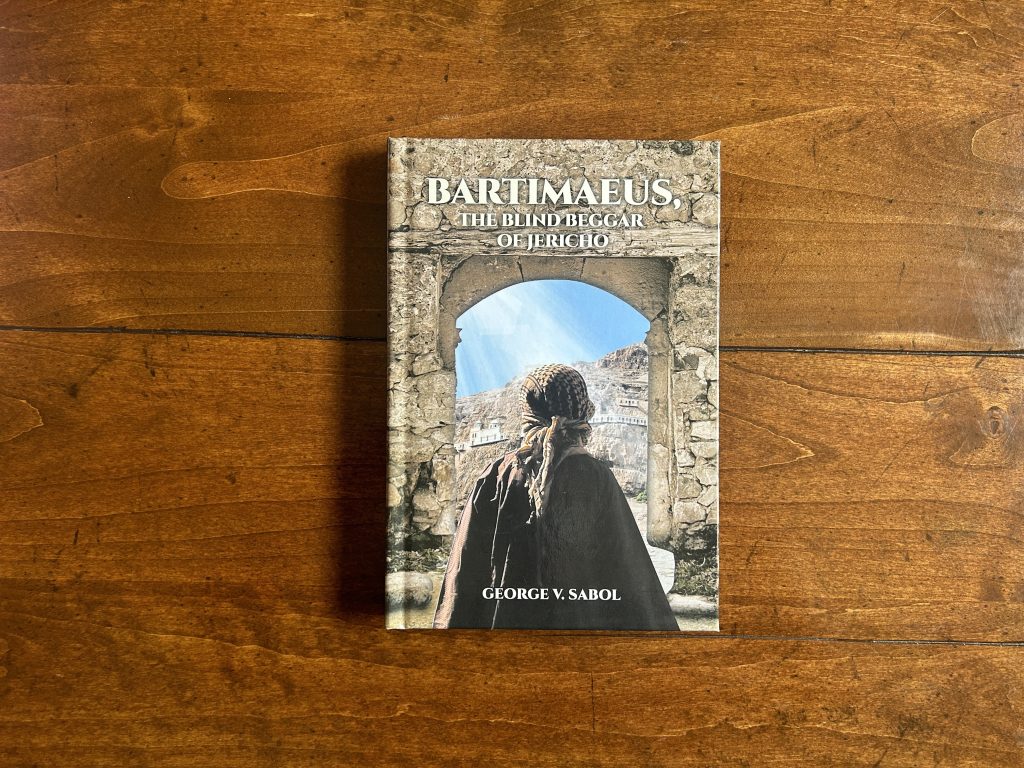Bartimaeus, the Blind Beggar of Jericho
- Home
- Book
Bartimaeus, the Blind Beggar of Jericho
Bartimaeus is the name of the blind beggar that was cured by Jesus at the gate of Jericho as Jesus traveled to Jerusalem where he was to be crucified a few days later. Although the gospels have many accounts of cures by Jesus, the cure of Bartimaeus is told in the synoptic gospels of Matthew, Mark, and Luke. Why did the three gospel writers include the same miracle narrative in their gospels and most interesting, why are Bartimaeus and his father, Timaeus, named in the gospel? Could it be that Bartimaeus had a greater role in the early Christian Church – a role that was known by the apostles but was not disclosed, possibly to avoid repercussions from the enemies of the Church? The question of who Bartimaeus was and what role he played in the early Church is the basis of the story.
The story of Jesus curing the blind beggar at the gate of Jericho is told in the gospels of Matthew, Mark, and Luke. Mark names the beggar Bartimaeus, the son of Timaeus. I believe that Bartimaeus was a well known and important person in the early Christian community and that is why not only is his cure told in three of the gospels, but he and his father are named. In this fictional story, Bartimaeus is a soldier for Herod and the brother-in-law to the evangelist, Saint Paul. He is struck blind in a horse accident and is labeled a sinner by Paul and rejected by his wife, Paul’s sister. He is cured by Jesus as Jesus passed through Jericho on His way to Jerusalem for the last time. Several days later, Bartimaeus traveled to Jerusalem to find Jesus and thank Him, but by then Jesus was crucified. Bartimaeus must then learn of Jesus through the apostles and is converted. Eventually he is sent by Peter to Damascus to seek out Saul who was struck blind in his attempt to persecute the early Christians. The story of Bartimaeus is one of conversion and a struggle to regain his family. The setting of the book is the early Christian period as told in the Acts of the Apostles. The story tells how Bartimaeus, and his father had performed heroic acts of courage and love that was known and cherished by the early Christian community. It is a love story of conversion and adventure.
-

Lutyens’ book follows the Church’s liturgical calendar beginning with the First Sunday of Advent. The meditation for each day is presented on one page. Apparently, the author’s intent was to stimulate rather than educate. Each daily meditation has a brief heading. That is followed by a scriptural reference. Then, each daily meditation is set in three sections; 1 – a reflective narrative on the cited scripture, 2 – an interpretive observation of the significance of the scripture to the world of Lutyens’ time, and 3 – an invitation to the reader to search the message of the scripture. Section 3 is often done in the form of questions. In Lutyens’ words, “They are designed to stimulate the mind to devotion by suggestion.”
In this book, I follow the same general format employed by Lutyens. Each daily meditation begins with a brief citation from scripture. Those are predominantly from the gospel of John; Saint Francis’ favorite scripture. Section 1 is typically a commentary on the gospel passage. Section 2 is a narrative from the life of Saint Francis or Saint Clare or one of their followers that exemplifies the selected gospel citation. Section 3, like Lutyens, is an invitation, often using questions, to stimulate the mind and soul to devotion by meditating on the gospel message and the example of the little brother from Assisi, Saint Francis.
This collection of 100 meditations follows, to some extent, the progression of Saint Francis’ conversion to Jesus Christ. It is noted that the author has occasionally used imaginative interpretations of both scripture and Franciscan history. It has been said that imagination can lead us closer to the truth than history and recorded fact. Although I do not claim my imaginary interpretations to be fact; my hope is that they serve to stimulate the reader to their own spiritual imagination and greater devotion to their God.